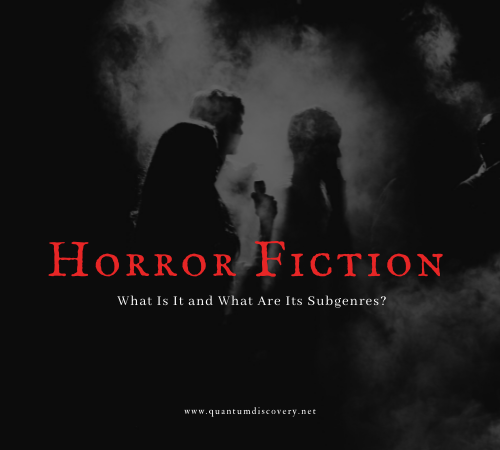People love being frightened, and they read horror tales because of that. However, there is more to creating a horror tale than the frightening portions. What is it about horror books that makes them so appealing?
What Is Horror Fiction?
Horror is a literary, cinematic, and television genre aimed at frightening, startling, shocking, and even repulsing viewers. A horror book, horror film, or horror television show’s primary goal is to instill fear in the reader via scary imagery, themes, and circumstances.
The narrative and characters are equally as essential as the tone and atmosphere in the horror genre. A horror story’s study of the unknown often shocks and provokes.
Subgenres of Horror Fiction:
Body Horror
It is characterized by vivid, unsettling depictions of human bodily abuse, such as deformity and mutation. Biological horror, organic horror, and visceral horror are often explored in which the physical body undergoes abnormal graphic change, degeneration, or annihilation.
Comedy
It is a parody or satire of traditional horror tropes. As such, it incorporates elements of horror/gore and dark comedy. Generally, comedy horror is classified into three themes: dark humor, parody, and spoof.
Creepy Kids
A subgenre in which children are often enchanted by evil or are born wicked. They turn against the elderly in the narrative. They subsequently become the story’s adversary, often stopped by other children or adults to rescue lives.
Extreme Horror
It features severe and brutal violence with a heavy emphasis on bloodshed and death. Also referred to as hardcore horror or splatterpunk, this subgenre includes the most violent, goriest, most frightening tales available. Gore is a meticulous writer who leaves no details to the reader’s imagination.
Gothic
Gothic horror incorporates mystery, castle ruins, the fall of the nobility, spirits/hauntings, and lunacy. The many places around the home are often indicative of the inhabitants’ mental and emotional states. It usually incorporates elements of horror, death, and romance into the same story.
Hauntings
A horror subgenre wherein spirits or demons haunt a specific home or location, such as the forests or near an old burial site. Often, the emphasis is on rectifying some evil that was done to release the spirits.
Historical
Historical horror is a tale set in a historical background with themes of terror. These tales are often based on actual events or periods and sometimes include fictionalized retellings of historical people or atrocities that happened. The protagonist presents a counter-narrative to accepted history.
Lovecraftian
A subgenre in which it is believed that aliens or extraterrestrial creatures controlled our planet in the past and would one day return to wipe out humankind. It is a subgenre of fiction that emphasizes the cosmic terror of the unknown (or unfathomable) rather than on gore or other aspects of shock and is named after American novelist H. P. Lovecraft, one of the genre’s pioneers.
Man-Made/Artificial
A subgenre in which artificial objects become the cause of dread. You’ll often discover apocalyptic wastelands and crazy scientists in these tales, as well as typical themes such as horrible illness, widespread pollution, and deformed animals.
Monsters
A type of horror in which non-human monsters seek, murder, and prey on people.
Aliens, classic monsters, gigantic monsters, mythological monsters, neo-monsters, tiny creatures, vampires, werewolves, or zombies are all examples of these life forms.
Mythic
A subgenre in which old mythology and folklore are heavily incorporated into the narrative, especially the darker, more frightening aspects. Mythic horror differs from fantasy because it often takes place in the actual world rather than a magical one.
Occult
It features witchcraft, magic, obscure brotherhoods, and spirit contact. Additionally, spiritualism, paranormal phenomena, Voodoo, and individuals with hidden or clandestine knowledge and power that are allegedly only accessible via magical or supernatural methods are frequent themes and tropes.
Psychic Abilities
In this subgenre, people possess psychic powers. These abilities may include reading minds, communicating with the dead, seeing the past or future, or manipulating things telepathically. It is often referred to as paranormal horror and incorporates elements of science fiction. However, although psychic talents are usually explored positively in science fiction, they cause fear in psychic abilities.
Psychological
In this subgenre, the subject’s mentality, such as a serial murderer, becomes their undoing. These are often human anxieties, mental instability, and emotional vulnerabilities that are explored in these tales. Psychological horror is often associated with supernatural and haunting subgenres since the protagonist may mistake the horrors tormenting their psyche for something otherworldly. Usually, it has an unreliable narrator.
Quiet Horror
Instead of blatant graphic violence or bloodshed, this subgenre provides a more subtle kind of dread. Also referred to as soft horror, silent horror frequently evokes a creeping feeling of foreboding while leaving most of the brutality to the reader’s imagination. The majority of the terror portrayed is intellectual rather than gory.
Young Adult
A subgenre that avoids overwhelming gore and often has a teenager as the protagonist. It may include monsters, mass killings, frightening creatures, or a slight amount of gore. Coming-of-age problems such as autonomy from parents, friendships, youthful romance/sexuality, and disobedience are often featured.
Are you looking for a literary agent? Handing your book to publishers is a daunting task. However, companies like Quantum Discovery can help you with your needs when it comes to having your book delivered to the right publisher. Contact our professionals by calling (888) 755-6875or visit quantumdiscovery.net to know more.

Pingback: Genres and Subgenres in Fiction - Quantum Discovery